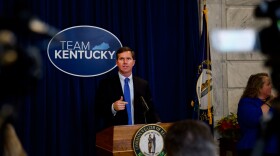A city budget is, ideally, a balance of policy, economics and accounting. In the middle of a pandemic, finding that balance can be tricky.
On April 23, Mayor Greg Fischer will present a tentative budget proposal to the Metro Council for the fiscal year starting on July 1. How the world may change by then -- and beyond -- cannot be known. That's why economist Paul Coomes says Louisville's upcoming budget will probably evolve over time, rather than getting locked in as usual by June.
"We've only been at this for shutdown three weeks. I mean, it feels like three months, but it's only been three weeks," said Coomes, Emeritus Professor of Economics at University of Louisville.
City officials and Coomes, who's serving as a consultant for Metro Council, are now starting to see the impacts on major revenue streams from the month of March. As they collect more data, projections about just how short the funds come up will become more robust.
Coomes recently built a model to assess the pandemic's impact on Louisville's economy. He mapped out 500 different industry sectors and assigned each of them a "shutdown rate" to estimate how many workers they've lost.
The rate for grocery stores is zero. For clothing stores, it's 80 percent. Using that, he estimates about a quarter of the workforce will be out of work and that, as a result, payroll will drop about 16%.
Now apply that to a theoretical two-month shutdown.
With occupational license fees making up nearly half of the city's $625 million general fund, that would translate to a loss of about $12.2 million from the city's coffers. Net profits taxes, which make up another 11% of the general fund, could drop by half, Coomes said.
His current projection is that hits to the two major sources of revenue for the city could make up nearly $18 million, or almost 3%. And that will take place in the current fiscal year.
Daniel Frockt, the city's chief financial officer, recently described the complexity of the current budget-planning situation. In addition to the factors Coomes is evaluating, federal actions such as potential stabilization funds and the postponement of the tax filing deadline will change the revenue landscape.
"There's a normal question in any economic downturn of what the floor might be and when it will be established, and how long we will stay there," Frockt said last week on a call with reporters.
Answering that question is difficult at the moment because it's not clear when free movement and normal business will be allowed again, he said.
In that call, Frockt said the city may consider using some of its rainy day fund to make up for some of the shortfall heading into the next fiscal year. He did not say whether Metro employee or budget cuts were likely.
Coomes is not involved in the city's policy-making, but he said common sense dictates using the rainy day fund is a reasonable approach.
"There's some negatives to that because it affects bond ratings and so on, but it's also why you have a rainy day fund," he said. "You could definitely say it's raining right now. It's a heavy rain."
All of Coomes' projections in this situation come with a big caveat: He said as new data comes in, assumptions could change by the day or even the hour.






